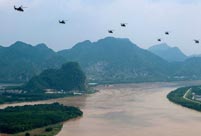

BEIJING, June 15 -- The Philippines is maneuvering its dispute with China in the South China Sea into an issue of national pride.
President Benigno Aquino made an outrageous comparison of China to Nazi Germany in a speech to the Japanese parliament earlier this month. Last week the Philippine government played the nationalist card by portraying itself as a victim in a documentary on the South China Sea aired on a government TV channel. Such a dangerous nationalist game requires meticulous care if regional stability is not to be threatened.
Co-produced by the Foreign Ministry and president's office, the documentary, "Kalayaan" (Freedom), was aired Friday to coincide with the independence day holiday.
The documentary rather fancifully summarized numerous ways the disputes with China had affected the archipelago's activities in the South China Sea. With stirring background music and a montage of various "victims" bellyaching about their innumerable grievances, the narrator directly blamed China for reducing the income of Philippine fishermen since the 2012 stand-off, in which both sides urged each other to pull out their vessels back from the Huangyan Islands.
The documentary also showed China as a bully and questioned China's rights over the South China Sea, in the name of "historical, economic and legal" perspective.
Joselito Kakilala, speaking on behalf of the Philippine military, said the purpose of the documentary was "to raise awareness about our territorial claim. Our countrymen must realize the importance of the West Philippine Sea (South China Sea) territories. We must be united in supporting the government's position in resolving the dispute peacefully."
The Philippine government seems to have confused patriotism and nationalism, escalating the anti-China sentiments while does nothing to resolve the disputes.
 |
 Abandoned village swallowed by nature
Abandoned village swallowed by nature Graduation: the time to show beauty in strength
Graduation: the time to show beauty in strength School life of students in a military college
School life of students in a military college Top 16 Chinese cities with the best air quality in 2014
Top 16 Chinese cities with the best air quality in 2014 Mysterious “sky road” in Mount Dawagengzha
Mysterious “sky road” in Mount Dawagengzha Students with Weifang Medical University take graduation photos
Students with Weifang Medical University take graduation photos PLA soldiers conduct 10-kilometer long range raid
PLA soldiers conduct 10-kilometer long range raid Stars who aced national exams
Stars who aced national exams
 PLA helicopters travel 2,000 kilometers in maneuver drill
PLA helicopters travel 2,000 kilometers in maneuver drill Hillary’s speech offers clue to Sino-US ties
Hillary’s speech offers clue to Sino-US ties Make me a genius
Make me a genius Weak yen weighing on China’s exports
Weak yen weighing on China’s exportsDay|Week